
Royal Philips has announced that Martini Hospital in the Netherlands has implemented its wearable ePatch and the artificial intelligence (AI)-driven Cardiologs analytics platform to monitor heart and stroke patients.
The implementation has been carried out at Martini Hospital’s specialised cardiac arrhythmia centre in Groningen.
Available as a ready-to-go unit, the new ePatch-based service enables extended insights into a patient’s health status as well as a longer duration of continuous recording.
The new technology gives Martini Hospital’s cardiology and neurology departments an end-to-end solution that improves their capacity to detect and diagnose atrial fibrillation, a type of cardiac arrhythmia.
The remote cardiac monitoring device, the first of its kind in the Netherlands, is applied to the patient’s sternum, during a visit to the doctor’s office.
Its comfortable, splash-proof design and ability to be worn even in the shower are said to help patients continue with their everyday tasks, including sports activities.
According to Philips, the sensor of the device constantly notes down and stores the patient’s heart activity day and night for up to two weeks.
The AI-based software then retrieves the recorded data, examines it for anomalies that can suggest heart arrhythmias, and automatically creates a concept report with findings for clinical trials.
Martini Hospital cardiologist Robert Tieleman said: “This innovative new service marks a significant leap forward in detecting and managing cardiac arrhythmias.
“With its advanced technology and user-friendly, end-to-end design, this new service enhances our ability to monitor and support heart and stroke patients.”
In a separate development, Philips agreed to settle one category of legal claims against the firm after a major recall of its sleep apnoea and respiratory devices.
The Dutch healthcare company will make an initial payment of $479 million into a fund to cover compensation for claimants covered by the settlement, with the amount varying depending on the type of device used, according to Reuters.
In 2021, Philips issued a recall for millions of breathing devices and ventilators designed for sleep apnoea treatment due to the potential cancer risk associated with the foam used to dampen noise from these devices.






